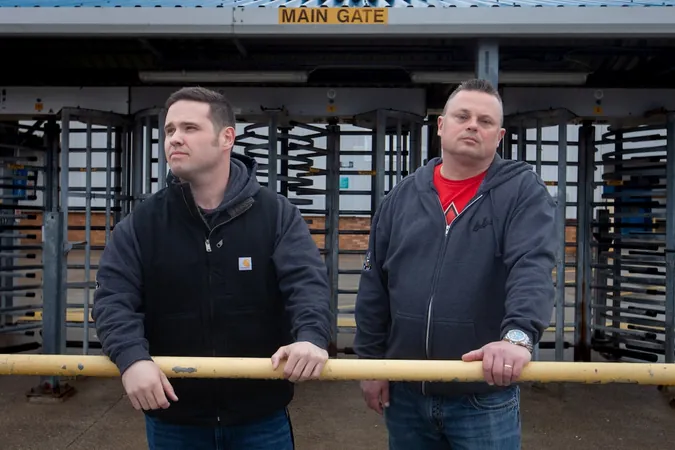
Windsor Faces Fallout from Trump's Tariff War
2025-04-13
Author: Olivia
A Heartbreaking Divide Between Windsor and Detroit
Windsor, Ontario, and Detroit: two cities separated by a sliver of water yet deeply intertwined through history and industry. However, recent tariffs imposed by U.S. President Donald Trump have created a formidable chasm between these motor cities, leaving Windsor grappling with severe economic repercussions.
Shutdowns and Layoffs Weigh Heavy on Workers
The impact is starkest at Windsor’s Stellantis NV plant, where production of the Chrysler Pacifica and Dodge Charger has come to a grinding halt. Approximately 3,500 workers were sent home for a two-week break as of April 3, coinciding with the onset of Trump’s 25% tariffs on imported cars. The ripples extend further, affecting 2,000 workers in the local parts supply chain.
Stellantis had barely announced the shutdown before the tariffs kicked in, with hopes of resuming operations briefly but uncertainty looms over future plans. The situation is compounded by a month-long closure at the Stellantis Jeep plant in Mexico, impacting another 2,600 workers. Experts predict Trump might escalate the tariff war with new tariffs on auto parts by early May, risking more shutdowns in an industry already squeezed by razor-thin profit margins.
The Personal Toll of Tariffs
For many workers like Derek Gungle, this shutdown feels uniquely devastating. Having witnessed layoffs before due to production changes and the pandemic, Gungle sees this crisis as a result of political maneuvering from our southern neighbor, aimed at dismantling the Canadian auto sector. "This feels like a man-made disaster," he lamented.
As families tighten their belts, budgets get scrutinized. Gungle recalls adjusting his household budget ever since the specter of tariffs loomed large, cutting back on dining out and even postponing significant purchases like a new home.
An Economy Built on Manufacturing at Risk
Windsor’s economy, thriving on manufacturing—particularly in the auto industry—is now in jeopardy. With a population of about 500,000, 50,000 individuals are employed in manufacturing, including at the Ford engine plant and numerous parts suppliers. The local fabric of industry is woven tightly together with their Michigan counterparts.
This interconnectedness was underscored when General Motors announced the impending closure of its CAMI Assembly plant in Ingersoll, Ontario. The ripple effect means that when assembly operations halt, so too do the suppliers that rely on them.
Tariffs Threaten Jobs and Economy on Both Sides of the Border
Auto jobs in Windsor are sought after, with wages averaging around $50 an hour. The severe implications of these tariffs stretch beyond Canada, impacting U.S. manufacturers and heightening concerns about a potential recession. Each job loss could trigger further layoffs, as each auto job typically supports seven additional jobs in the community.
As young workers like Austin Welzel adjust their life plans amid looming uncertainty, the emotional toll of these decisions hangs heavy. "When the announcement came, it felt like a kick in the gut," he expressed.
The Bigger Picture: Manufacturing Strategy under Threat
Trump's tariffs on steel and aluminum are compounding pressures within both countries. The long-term effects of this protectionist approach could devastate the Canadian auto industry and backfire on American manufacturing as well. Industry leaders are already voicing concerns over the viability of maintaining production amidst such high tariffs.
Linda Hasenfratz of Linamar emphasizes that relocating auto manufacturing back to the U.S. is not feasible and that the shift in strategy contradicts the fundamental reasons companies chose their respective locations in the first place.
A Call for Action and Unity
As the situation unfolds, Windsor's labor leaders feel a profound sense of betrayal from their American neighbors. James Stewart, president of Unifor Local 444, describes it as a feeling of hurt among friends, urging that these tariffs are unsustainable.
The looming threat of additional tariffs could lead to a devastating halt in production and investment in Ontario’s auto industry, solidifying fears of long-lasting damage. Windsor stands at a precarious crossroads as both cities face the consequences of a tariff war that threatens their economic future together.









 Brasil (PT)
Brasil (PT)
 Canada (EN)
Canada (EN)
 Chile (ES)
Chile (ES)
 Česko (CS)
Česko (CS)
 대한민국 (KO)
대한민국 (KO)
 España (ES)
España (ES)
 France (FR)
France (FR)
 Hong Kong (EN)
Hong Kong (EN)
 Italia (IT)
Italia (IT)
 日本 (JA)
日本 (JA)
 Magyarország (HU)
Magyarország (HU)
 Norge (NO)
Norge (NO)
 Polska (PL)
Polska (PL)
 Schweiz (DE)
Schweiz (DE)
 Singapore (EN)
Singapore (EN)
 Sverige (SV)
Sverige (SV)
 Suomi (FI)
Suomi (FI)
 Türkiye (TR)
Türkiye (TR)
 الإمارات العربية المتحدة (AR)
الإمارات العربية المتحدة (AR)